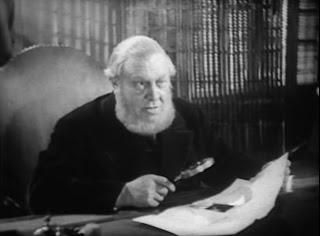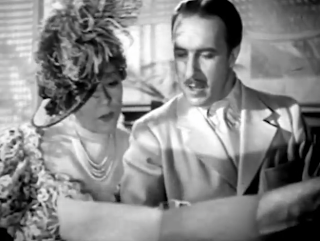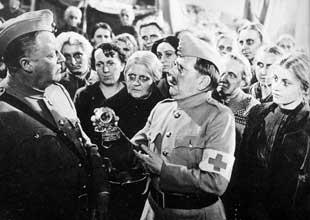
"The belief in our cause is stronger than death!"
Joseph Goebbels commissioned Ohm Kruger (1941) after watching Gone With the Wind, resolving to make his own historical drama. Looking to spur anti-English sentiment, Goebbels chose the Boer War as a subject. Hans Steinhoff's cockeyed epic condemns Britain for atrocities the Nazis were committing in real life.Paul Kruger (Emil Jannings) is the wizened president of South Africa's Transvaal Republic. English adventurer Cecil Rhodes (Ferdinand Marian) eyes South African gold reserves, hoping for conquest through war or bribery. Kruger defies Rhodes' perfidy, causing Secretary of State Joseph Chamberlain (Gustaf Grundgens) to declare war. The Boers successfully resist the invaders, with the British resorting to cruel measures.
Like all Nazi epics, Ohm Kruger offers stunning scope. Steinhoff reenacts the Boers' Great Trek, parades and battles with aplomb. The centerpiece is an epic pitched battle marshaling 25,000 Wehrmacht extras, matched later by an Eisenstein-inspired massacre. It's stirringly, if not artistically shot; having Goebbels bankroll your production affords endless resources.

Early on, British missionaries distribute Bibles and rifles to Africans while singing God Save the Queen! Hilariously on the nose, this sets Ohm Kruger's tone. When the British aren't manipulating tribesmen and bribing Boer politicians, they're provoking war. Soldiers burn farms and herd civilians into concentration camps, where they're shot or starved, soldiers insisting they're just following orders. The irony's lost on no one.
Steinhoff depicts British statesmen as duplicitous savages. Rhodes is a capitalist blackguard, buying Boer land while encouraging Leander Jameson (Karl Haubenreißer) to provoke violence. Queen Victoria (Hedwig Wangel) is a doddering drunk, easily swayed by Chamberlain. From her deathbed, she squawks the dread consequences of British defeat in South Africa: world peace!
Perfidious Albion meets its match in Paul Kruger. Derided as a "cattle breeder" by his adversaries, Kruger's a crafty statesman with unshakeable nationalism. Immune to bribes and persuasion, he bullies African tribesmen, resists Rhodes and outwits political rivals. His nation of warrior-farmers beats plowshares into rifles; everyone from teens to 82 year olds join. Blinded by an eye infection, Kruger's a tragic patriarch who foresees the consequences of collaboration.

Emil Jannings's outsized performance helps. He injects humor and warmth, whether arm-wrestling with a general or playing with two of his 45 grandchildren. Jannings also captures Kruger's integrity and indignation with hammy aplomb. Roguish Ferdinand Marian and silky Gustaf Grundgens are effective villains; grotesque Hedwig Wangel and boorish Otto Wernicke, less so. Werner Hinz later played Rommel in The Longest Day.
Compared to Jud Suss, Ohm Kruger is more head-scratching than offensive. It envisions a Bizarro World where the Nazis are an oppressed people rather than colonizing empire. One imagines that Jews, Poles and Russians weren't amused.

